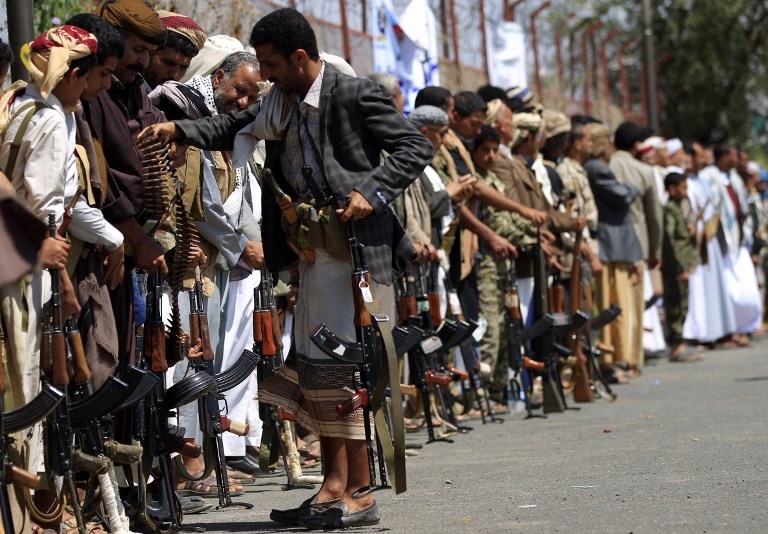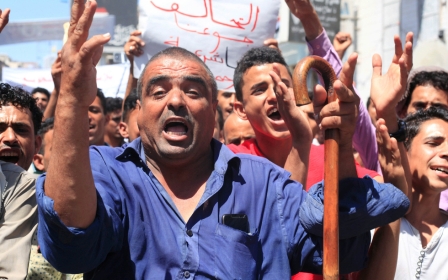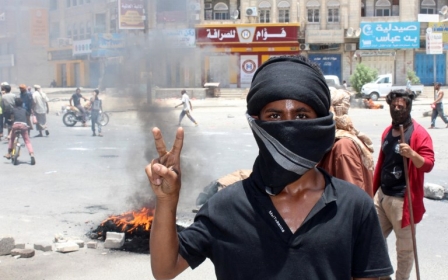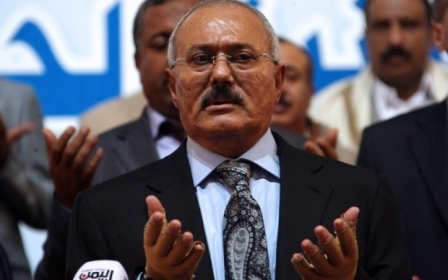Houthis suppress poverty protest in Yemen's Sanaa, arresting several women

SANAA - Nine women who defied a mass mobilisation of pro-Houthi militia in Yemen's capital were arrested on Saturday following calls for a protest over poverty and hunger in the war-torn rebel areas of the country.
On Saturday morning, the Houthis deployed armed groups throughout the city, including the squares that protest organisers had planned to use, so many did not show up.
Anti-Houthi activists recently announced via social media that 6 October would be the first day of "the revolution of hungry people" protests in the capital Sanaa.
However, Houthis then said that they planned armed demonstrations in several of the same areas, a clear message to the protesters not to take to the streets.
Only a few of Sanaa University's women students attempted to protest. "The women were just beginning to chant when Houthi women chased them and beat them with large sticks," said Ahmed, an anti-Houthi activist whose name has been changed for safety reasons.
Fewer than 20 women protested, and they were chased by Houthis, who arrested nine as the rest fled.
Still, the actual numbers were unclear as the AFP news agency reported that the Houthis had detained at least 55 students, including 18 women, near Sanaa University.
"The Houthis threatened us, so we, as men, could not take to the streets, and only a few female students were brave enough to face the Houthis," Ahmed said.
"Yemen society is conservative, and we did not believe that the Houthis would arrest women, as it is a shame in Yemeni traditions and taboos, but they did."
He confirmed that not only Houthi women but also fighters participated in beating the women, then took them to al-Gudairi police station in an armed vehicle.
"The Houthi fighters transported the women to the police station, then on to an unknown location, and took their mobiles so we cannot contact them," Ahmed said.
The Houthi-controlled Saba news agency said this morning that "the security authorities arrested some mercenaries in the capital Sanaa; their behaviour disturbed the public peace and they were spreading rumours".
Saba said a source had confirmed that one of the arrested women admitted that the Saudi-led coalition ordered them to call to protest under "false" pretexts to exploit the current poor economic conditions.
An anonymous woman activist told MEE that she had planned to take part in the protest but felt that it was dangerous.
"I was going to participate together with my colleagues, but the Houthis in the university threatened to arrest us, so I went home," she told MEE.
She said she hopes that the Houthis will release her colleagues, saying: "The Houthis have failed in everything, but they succeeded in suppressing the protests."
The students were released at the end of the day after signing a pledge not to take part in demonstrations again, one of them said, asking not to be identified for fear of retribution, according to Reuters. She said female Houthi supporters "attacked us with electric shock batons and clubs, supported by armed men".
Rasha Jarhum, a Yemeni activist based in Canada, tweeted today: "The women in Sanaa are so brave. They are facing a vicious armed militia and were calling clearly for Houthis to withdraw from Sanaa. Their peaceful protest was disbursed by force and many women were detained."
The Women Solidarity group issued a statement on Sunday calling for the immediate release of "arbitrarily detained women" in Sanaa.
Ghalib Moamar, an activist in Taiz city, said the repression of protests is not a solution but actually encourages people to demonstrate.
"When we took to the streets in Sanaa in 2011, Saleh's forces attacked us and killed some protesters, so the next day more people arrived at the square," Moamar told MEE.
He foresees a similar scenario if the Houthis continue to repress peaceful protests that demand basic needs.
He added: "The protest this morning was not against the Houthis, it was against the collapse of the currency and it happens everywhere around the country, but the repression is a habit of the Houthis."
There have been protests in Taiz, Aden, Hadhramout and other governorates, and all of them were against the collapse of the currency, but no one was arrested except in Sanaa.
At least 10,000 people have been killed since Saudi Arabia and its allies intervened in 2015 to support the government in its fight against the Houthis.
The war has triggered what the UN calls the world's largest single humanitarian crisis, with more than three-quarters of the population in need of aid and 8.4 million people at risk of famine.
New MEE newsletter: Jerusalem Dispatch
Sign up to get the latest insights and analysis on Israel-Palestine, alongside Turkey Unpacked and other MEE newsletters
Middle East Eye delivers independent and unrivalled coverage and analysis of the Middle East, North Africa and beyond. To learn more about republishing this content and the associated fees, please fill out this form. More about MEE can be found here.




